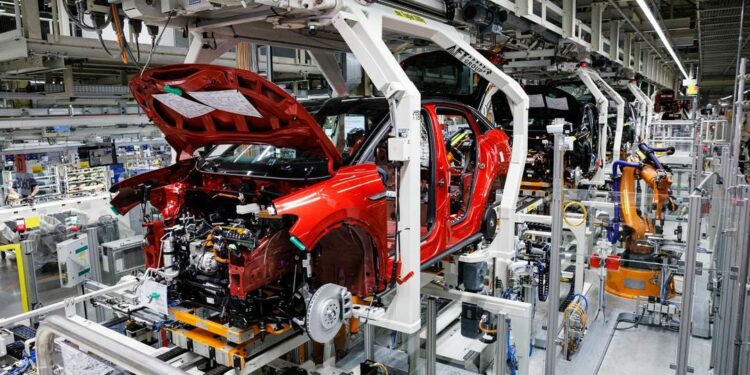Carmakers have struggled to maintain production levels for over a year owing to a computer chip shortage that shows no sign of easing. Now in the aftermath of Russia’s invasion of Ukraine that sent oil prices surging, the auto industry’s efforts to ramp up electric vehicle output may be hampered by a spike in nickel prices–a metal mined in Russia and used for advanced batteries.
Trading in nickel was halted Tuesday on the London Metal Exchange after the price shot up to more than $100,000 a ton. Like oil, that’s byproduct of tough, broad international sanctions imposed on Russia to pressure President Vladimir Putin to rethink his unprompted attack on neighboring Ukraine. So far, sanctions haven’t been applied to nickel.
Russia is the third-biggest producer of nickel, behind Indonesia and the Philippines, mining 250,000 metric tons of it in 2021, according to U.S. government data. Along with batteries, the metal is also needed to make stainless steel and supply disruption fears mean more headaches and higher costs for manufacturers. The rising cost of nickel could add about $1,000 to the price of an average EV, according to Dan Ives, an equity analyst for Wedbush Securities.
“Volatility is the norm right now,” says Simon Moores, CEO of Benchmark Mineral Intelligence. “Unless EV and battery makers have rock-solid, long-term supply agreements or own their own mines, they will have no choice but to eat these sky-high and rising prices.”
“Volatility is the norm right now”
Putin’s war is proving to be another complication for efforts in the U.S., Europe and Asia to wean motorists off gasoline and diesel fuel and switch to electric vehicles that don’t emit tailpipe exhaust and carbon emissions. That transition is to unfold over the next decade, as the range of models expands–particularly of more affordable battery-powered cars and trucks. The cheapest Tesla, a base version of its Model 3, currently costs $46,440–or about $50,000 when taxes and other fees are added. Though a base model Nissan Leaf runs about $30,000 (before a federal tax credit), most new electric autos in the U.S. sell for at least $40,000, while luxury vehicles such as the top-end Lucid Air go for more than $169,000. In the short term, higher purchase costs will make it tough for millions of drivers to give up gasoline.
Along with nickel, other metals the auto industry relies on including palladium–needed for catalytic converters–and lithium and cobalt which are also used for batteries also continue to rise. That will make it tougher to drive down the price of EV batteries even as the technology continues to improve.
European manufacturers, who are most reliant on Russian nickel, will see the biggest impact, according to Moores. Russia’s Nord Stream 2 gas pipeline has illustrated Europe’s energy reliance on Russia, but the nickel supply chain from Russia to Finland to Germany to make cathode material for EV lithium-ion batteries is equally problematic, he says.
“The bitter irony about this entire situation is Europe wants to wean itself off Russia’s oil and diesel and shift from ICE vehicles to EVs, but will still need to rely on Russia’s nickel supply,”
The range of challenges facing automakers–including chips, supply chain headaches and spiking commodity costs–is unprecedented in recent times, according to Morgan Stanley analyst Adam Jonas. “I’ve seen a fair amount over more than 25 years analyzing the auto industry at Morgan Stanley. The dispersion of outcomes and lack of visibility confronting auto investors today surpasses anything I have ever observed.”











